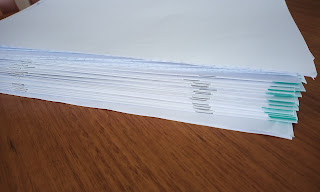Continuing on my AI in education advent calendar...
I stumbled upon a solution to a really annoying problem. You've just gone through a whole pile of marking... (the picture was about a third of the pile from one course)... and then you wonder whether you've gone cross-eyed and entered the wrong numbers into the spreadsheet / learning management system / course management system.
We have flawless speech-to-text now. We have access to language models that can do tedious tasks.
So at the end of the marking, I open up a sound recorder on my phone or my laptop, flick through the exam papers and talk narrate the student marks as I go. "Xu Anh student number 23424 scored 41.5, Tom Bowman student 28559 scored 34, Amy Chin student 29912 scored 26, Daniel Davids student id 28588 scored 37...". Run that through Whisper ( https://openai.com/research/whisper or any of the desktop apps that use it, e.g. MacWhisper ) and you'll get what you said in text. It gets even the most complicated names right if you pronounce them correctly.
Now take a download from your marks management system (or the spreadsheet that you were typing them in to). If you have access to GPT4, you can upload the spreadsheet. If you are using GPT-3.5 or a free LLM like llama, copy and paste from the spreadsheet.
Then the magic prompt: "identify if there are any discrepancies between this spreadsheet and the transcript of me reading out the marks".
Works like a charm, every time.
